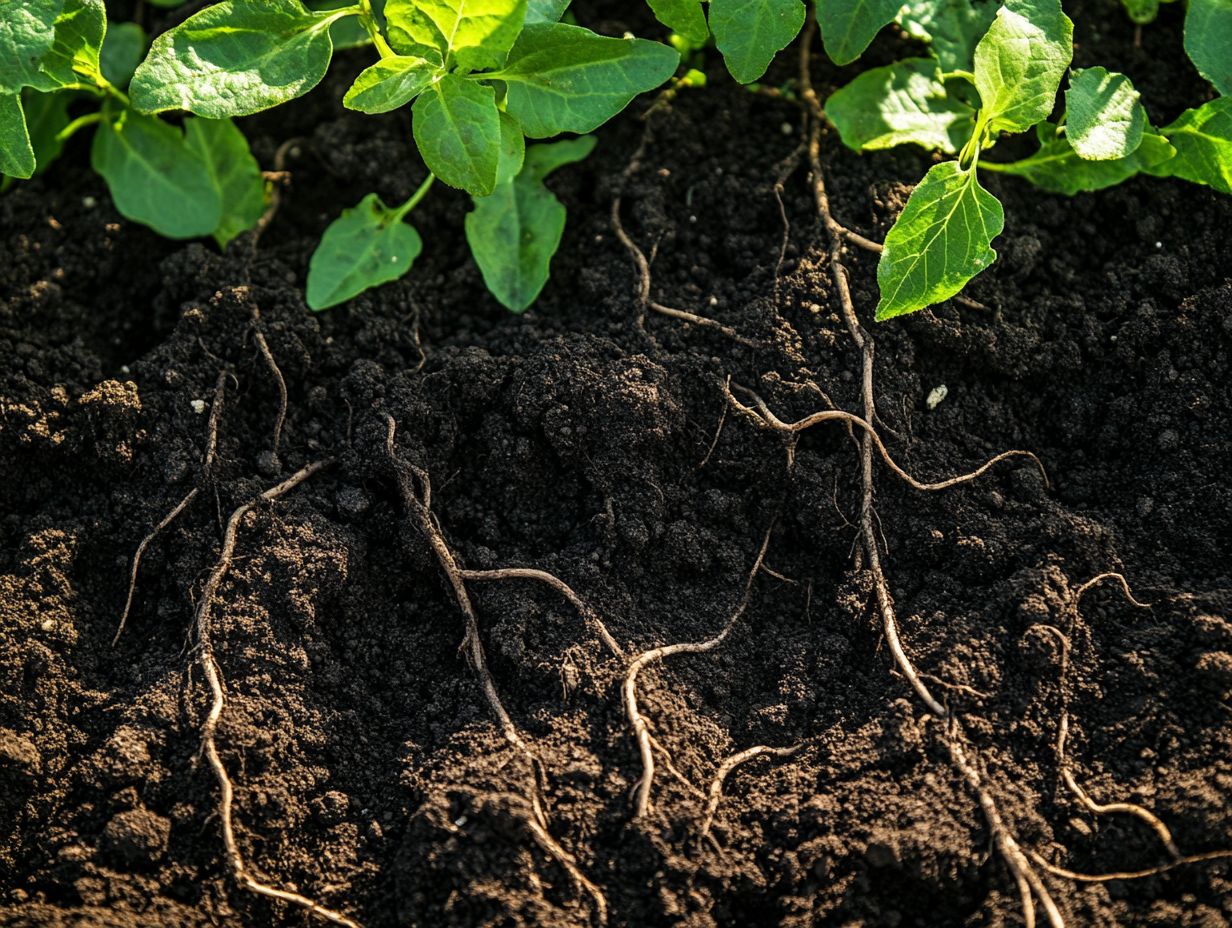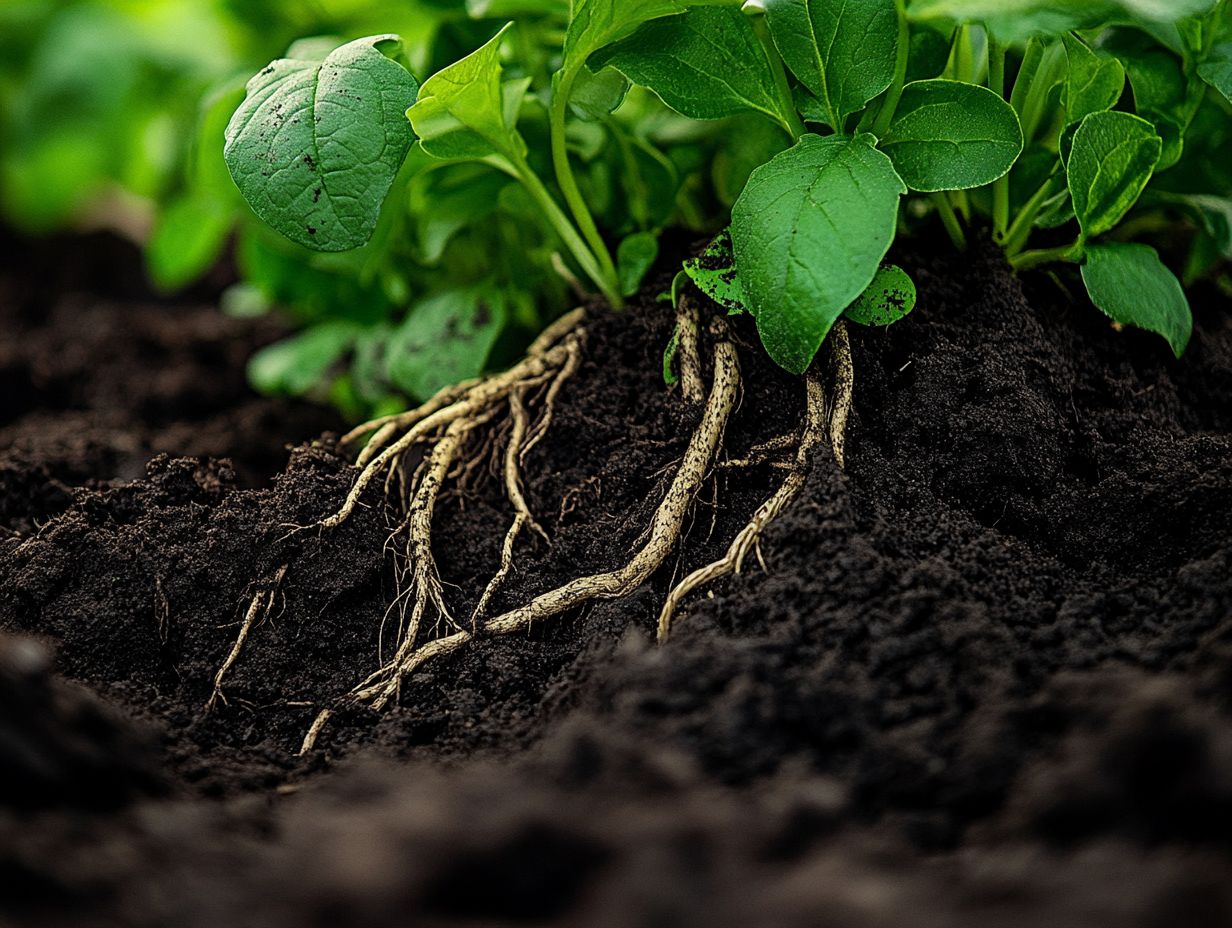The Role of Soil Quality in Plant Health
Soil quality is vital for healthy plant growth and thriving ecosystems.
Understanding this significance helps you optimize your yields and support sustainable practices.
This article explores the signs of poor soil quality, key factors influencing its health, and effective methods to enhance it. By uncovering the vital role soil plays in plant health, you can promote better crop production while nurturing the environment.
Join us as we uncover the fascinating world of soil quality!
Contents
Key Takeaways:
- Soil quality plays a crucial role in the growth and health of plants.
- Watch for signs of poor soil quality through nutrient levels, pH balance, and environmental factors.
- Improving soil quality boosts crop production and supports sustainable agriculture.
The Importance of Soil Quality
Soil quality lies at the very heart of agricultural sustainability and the vitality of our ecosystems.
It influences everything from food production to the resilience of agricultural lands.
When the soil is healthy, it teems with organisms that perform essential roles in nutrient cycling and fostering biodiversity.
The state of the soil has profound implications for environmental quality, affecting greenhouse gas emissions and the overall health of ecosystems.
By grasping the significance of soil quality, you can adopt effective soil management strategies that ensure the long-term success of your agricultural endeavors.
Impact on Plant Growth and Health
Healthy soil is essential for your plant growth and vitality.
It provides the key nutrients that directly influence crop yields and overall agricultural productivity.
This nutrient-rich medium ensures your crops receive the specific elements necessary for vigorous development.
Key nutrients like nitrogen, phosphorus, and potassium form the backbone of soil fertility.
Each nutrient uniquely supports vital plant processes, such as photosynthesis and root development.
Nitrogen, essential for leaf growth, often comes from organic matter and soil bacteria.
Phosphorus aids in energy transfer within the plant. Potassium helps regulate water uptake and enhance disease resistance.
The soil’s composition, including its texture and organic content, significantly affects nutrient availability and retention.
This ultimately determines how well your plants can flourish in their environment.
Signs of Poor Soil Quality
Spotting signs of poor soil quality is crucial for your success!
You should look for indicators like soil erosion, degradation, and pollution.
These factors can severely impact soil health and reduce productivity while compromising environmental quality.
Engaging in soil testing is essential; it helps you identify these issues early, allowing timely interventions.
These interventions can restore soil quality and enhance overall health.
Identifying Soil Issues

You need to evaluate various soil properties to identify issues.
This includes assessing the tiny organisms that contribute to soil health.
To diagnose these challenges effectively, employ soil testing techniques like pH testing, nutrient analysis, and moisture assessment.
By analyzing the results, you gain insights into specific deficiencies or imbalances in your soil.
Understanding the roles of soil organisms, such as bacteria and fungi, is crucial.
These organisms play an essential role in nutrient cycling and organic matter decomposition.
By incorporating the right soil amendments, you can significantly enhance soil conditions.
This effectively restores its vitality and fosters a more productive growing environment.
Factors Affecting Soil Quality
Numerous factors influence soil quality, such as nutrient levels and soil pH. Various environmental conditions can contribute to soil degradation and erosion. Grasping these factors is important for effective soil conservation practices and enhancing soil health.
From natural circumstances to human activities, each element plays an important role in shaping the overall quality and fertility of the soil.
Nutrient Levels and pH Balance
Nutrient levels and soil pH are crucial for soil fertility. They directly influence your crop nutrition and agricultural outputs.
These factors determine the availability of essential minerals. They also affect the soil’s activity of living organisms, which is crucial for plant health.
If your soil pH swings too high or too low, it can obstruct nutrient absorption. This leads to deficiencies that stunt growth and reduce yields.
To enhance crop nutrition, you can adopt several strategies, such as nutrient management and regular soil testing:
- Regularly test soil for pH and nutrients,
- Apply organic amendments like compost, and
- Utilize cover crops to naturally replenish nutrients.
By implementing these practices, you ll cultivate a robust and fertile soil ecosystem. This paves the way for sustainable agricultural success.
Environmental Factors
Environmental factors, including climate conditions and human activities, have a significant influence over soil conservation and the risk of soil erosion.
These elements determine the overall quality of soil. In turn, this quality serves as the foundation for agricultural productivity and biodiversity.
For example, fluctuations in precipitation and temperature can change vegetation cover. This impacts soil structure and its ability to retain moisture.
Unsustainable practices like over-farming or deforestation can worsen erosion. They erode the land’s natural resilience.
Understanding this complex relationship makes it essential for you to adopt sustainable practices. By doing so, you can help mitigate the effects of climate change, ensuring soil health preservation and fostering a balanced ecosystem.
Improving Soil Quality

Enhancing soil quality is achievable through a variety of effective methods that improve soil management and fertility. Techniques like crop rotation, applying soil amendments, and consistent soil testing can significantly boost soil health and productivity.
By embracing sustainable practices, you can cultivate healthier soil ecosystems. These ecosystems support strong crop yields and reduce environmental impacts.
Methods for Enhancing Soil Health
Methods for enhancing soil health are essential for maintaining productive agricultural systems and fostering biodiversity.
Crop rotation is a particularly effective strategy. It allows you to alternate different crops that replenish and utilize various nutrients from the soil.
This practice disrupts pest cycles and lowers the risk of diseases. It creates a more favorable environment for beneficial organisms.
Incorporating soil cover through cover crops not only shields the soil from erosion but also enhances its structure and water retention.
These approaches improve soil nutrient availability. They also promote the intricate web of life within the soil, contributing to a resilient ecosystem capable of withstanding the pressures of climate change and agricultural demands.
The Role of Soil Quality in Sustainable Agriculture
The significance of soil quality in sustainable agriculture is crucial. It directly impacts crop production, environmental health, and the effectiveness of soil conservation practices.
Healthy soil lies at the core of sustainable farming. It serves as the foundation for nourishing crops and robust ecosystems.
By prioritizing soil quality, you can ensure long-term sustainability and productivity in your agricultural pursuits.
Benefits for Crop Production and the Environment
The advantages of soil quality go far beyond crop production. They also include significant environmental benefits that promote a sustainable future.
When you nurture healthy soil, it retains water effectively. This reduces your need for irrigation, even during dry spells.
High-quality soil acts as a natural filter, improving water quality by breaking down pollutants and preventing harmful runoff into nearby water bodies.
As a farmer, you can adopt soil management strategies to enhance both soil structure and fertility. Practices such as changing what you plant in each field each season, cover cropping, and adding organic matter can greatly benefit your soil.
These practices not only promote vigorous crop growth but also boost soil biodiversity, making ecosystems more resilient and healthier.
Placing importance on soil quality creates a balance between agricultural productivity and ecological health.
Your Top Soil Quality Questions Answered!

What is the role of soil quality in plant health?
Soil quality is the heart of healthy plants! It provides essential nutrients, water, and support for plants to grow and thrive.
How does soil quality affect plant growth?
Poor soil quality can lead to stunted growth and low yield. Healthy soil, on the other hand, promotes strong plant growth and improves crop yields.
What are some factors that contribute to soil quality?
Soil quality is influenced by factors such as soil particle composition, structure, nutrient levels, pH balance, and the presence of soil organisms.
Can soil quality be improved?
Yes! Soil quality can be enhanced by adding organic matter, using cover crops, changing what you plant each season, and managing irrigation and fertilization effectively.
Why is it important to maintain good soil quality?
Maintaining good soil quality is crucial for sustainable agriculture. It ensures healthy plant growth, reduces the need for chemical inputs, and protects the environment.
How can soil quality impact crop production?
Poor soil quality can lead to reduced crop yields and lower quality. In contrast, good soil quality increases productivity and enhances crop quality, ensuring the sustainability of agricultural soils.
Interested in learning more about improving soil quality? Contact a local expert today!






